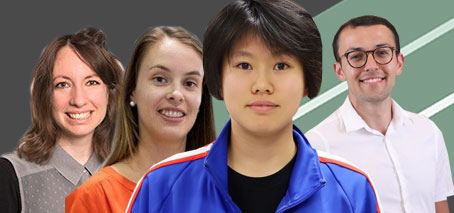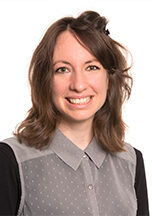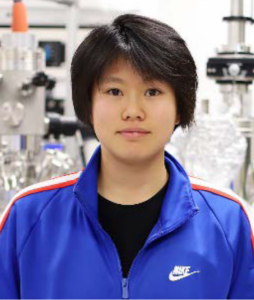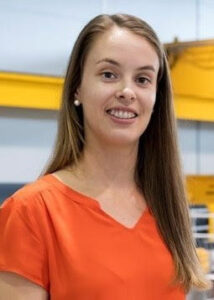FLEET welcomes four new research fellows, working in disparate roles across the Centre and all contributing to the improved diversity that makes the Centre greater than the sum of its parts:
- Dr Emma Laird (UQ)
- Dr Yonatan Ashlea Alava (UNSW)
- Dr Mengting Zhao (Monash)
- Dr Grace Causer (Monash)
The four new fellows were successful candidates among 35 applicants for the Centre’s Women in FLEET or Diversity in FLEET fellowships.
Dr Emma Laird (UQ) is a quantum theorist working at the interface of condensed-matter physics and the physics of ultracold atomic gases. She recently completed a physics PhD with FLEET’s Dr Jesper Levinsen and Prof Meera Parish at Monash University on strongly interacting Fermi gases, which incorporated pairing in excitonic systems and novel Feshbach resonances. Moving north to a Fellowship position with Prof Matthew Davis at the University of Queensland, Emma will apply her expertise in few-body physics to study the dynamics of the emergence of superfluidity in quenched Fermi gases, connecting with experiments of FLEET CI Prof Christopher Vale at Swinburne University.
“FLEET’s Fellowship will help me overcome the varied setbacks I faced whilst pursuing a career in physics, and will allow me to establish myself as an independent researcher within an organization that highly values the contribution of women physicists.”
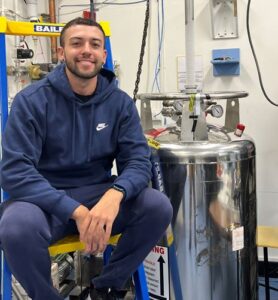
Dr Yonatan Ashlea Alava, new Research Fellow at UNSW
Dr Yonatan Ashlea Alava (UNSW) works with FLEET CI Prof Alex Hamilton studying novel approaches to optimise the electronic properties of GaAs structures for the creation of topological systems. Yonatan utilises clean-room nanofabrication techniques to make the quantum devices, and performs transport measurements at cryogenic temperatures to study their quantum properties.
“I am grateful to be part of a Centre of Excellence that acknowledges the under-representation of minority groups in STEM and takes affirmative action to become an example of a more equitable and diverse workspace,” says Yonatan.
“My lived experience as an international student at the intersection of low SES, queerness, cultural and linguistically diverse background makes this fellowship of particular interest to me as it completely aligns with my personal and professional values, which means this is the perfect opportunity for me to give back to the community in the same way that this fellowship would support me.”
Dr Mengting Zhao (Monash)is an experimental physicist specialising in atomic and electronic characterisation of materials using scanning tunnelling microscopy, scanning tunnelling spectroscopy, Xray-diffraction and other techniques, as well as fabrication and synthesis of 2D materials using molecular beam epitaxy. Mengting, who has previously worked with FLEET’s team at the Institute for Superconducting and Electronic Materials (University of Wollongong), will be working with FLEET AI Dr Mark Edmonds, CI Prof Michael Fuhrer and PI Dr Anton Tadich at the Australian Synchrotron.
“Joining FLEET as a postdoctoral fellowship is a great honour and an excellent opportunity for me. I look forward to becoming a member of the large FLEET family and continuing my study of 2D magnetic materials!”
Dr Grace Causer (Monash) is an experimentalist interested in exploring the role that dimensionality and anisotropy play on the phase diagrams of topological materials, and how these materials can be optimised for future computing applications.
Grace, who previously completed her PhD at UOW in conjunction with ANSTO, will work with Monash’s Michael Fuhrer (School of Physics and Astronomy) and Julie Karel (Engineering). She brings expertise in studying magnetic-interface phenomena in topological materials, 2D systems, thin films, and single-crystals, using techniques such as small-angle neutron scattering, polarized neutron reflectometry, X-ray reflectometry and diffraction as well as traditional lab-based measurements systems such as VSM and SQUID magnetometry.
“I enjoy the opportunity and the challenge that comes with studying topological materials, and understanding their properties by experimental and theoretical means,” says Grace. “I relish the opportunity to work on my leadership and management skills within FLEET while actively seeking out internal and/or external opportunities to continue building my research profile.”
Diversity Fellowships at FLEET
To maximise the effectiveness of our research team, and to improve diversity in Australian science, FLEET has added new Diversity Fellowships to complement the previously existing Women in FLEET Fellowships. This opens up our fellowships to a wider range of applicants from under-represented groups in Australian STEM.
Diversity in FLEET Fellowships are open to individuals from any group that is under-represented in Australian STEM, or who have experienced uncommon hardship. Examples include, but are not limited to applicants who:
- Identify as Aboriginal and/or Torres Strait Islander
- Have a disability or who cares for a person with a disability
- Identify as LGBTIQA+
- Are from a regional / remote area
- Are from a disadvantaged or low socio-economic background
- Are from a refugee background
- Have experienced uncommon hardship, which could include, but is not limited to experiences of domestic violence or debilitating health issues.
Both categories of Fellowship allow for improved flexibility in the location and type of position on offer. Rather than advertising highly-focused research roles with specific expertise criteria, which is standard in scientific recruiting and contributes to maintaining the status quo in gender balance and diversity.
Instead, Women in FLEET and Diversity Fellowships allow for applications from talented individuals whose research interests align with any research areas within FLEET, giving applicants the choice to nominate investigators they want to work with.
Successful new Fellows could have been experimental or theoretical, physicists, chemists or engineers, located at any of seven universities. The flexibility of offering whichever field suits the best applicants available allows the widest choice of applicants, ensuring FLEET has hired the best possible candidates.
The effectiveness of this broader search in allowing FLEET to find excellent researchers who may have been missed in previous, narrowly-targeted searches was confirmed by the remarkable increase in applications for previous Women in FLEET Fellowships.
FLEET has received many more applications for each round of Women in FLEET fellowships than the combined total from all previous, more-targeted searches. In the first round alone (2019), FLEET had 68 applicants, whereas 15 previous, more-targeted searches had averaged only two female applicants per search. Another 35 applicants put their names forward for Women in FLEET and Diversity in FLEET fellowships in 2021–22.
Read more about Diversity in FLEET Fellowships

